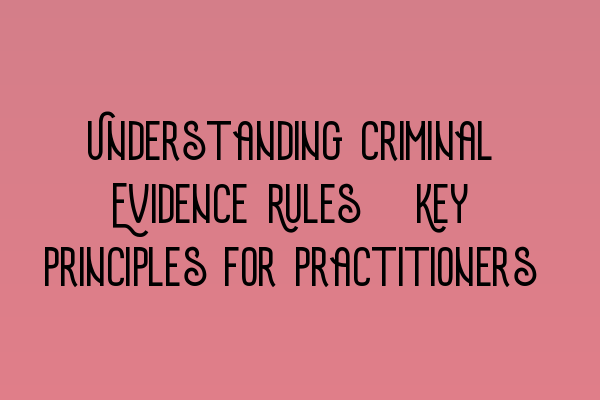Understanding Criminal Evidence Rules: Key Principles for Practitioners
As a criminal law practitioner, it is crucial to have a thorough understanding of the rules governing criminal evidence. The successful presentation of evidence is essential for building a strong case and achieving a favorable outcome for your clients.
In this article, we will explore the key principles that every practitioner should be familiar with when handling criminal evidence. By mastering these principles, you will enhance your ability to navigate the complex world of criminal law and effectively represent your clients.
1. Admissibility of Evidence
One of the fundamental principles of criminal evidence is the admissibility of evidence. Only evidence that is deemed admissible can be presented before the court. The admissibility of evidence depends on various factors, including relevance, authenticity, and hearsay.
SQE 1 Practice Exam Questions have specific questions related to the admissibility of evidence, which can help you test your understanding of this principle.
2. Chain of Custody
The chain of custody refers to the documented and unbroken trail of evidence from its seizure to its presentation in court. It is crucial to establish and maintain an accurate chain of custody to ensure the integrity and reliability of the evidence. Failure to maintain the chain of custody may result in the evidence being deemed inadmissible.
3. Character Evidence
Character evidence involves evidence concerning a person’s reputation, traits, or disposition. Generally, character evidence is not admissible in criminal trials unless it is directly relevant to the case. Understanding the limitations and exceptions related to character evidence is essential to effectively challenge or present such evidence in court.
4. Expert Opinion
Expert opinion evidence plays a significant role in criminal trials. It involves the testimony of an expert witness who possesses specialized knowledge or expertise in a specific field. To establish the admissibility of expert opinion evidence, certain conditions need to be met, such as the qualifications and reliability of the expert.
If you are preparing for the SQE exams, practicing SQE 1 Practice Mocks FLK1 FLK2 is a great way to test your understanding of the rules governing expert opinion evidence.
5. Hearsay
Hearsay is an out-of-court statement offered for its truth. Generally, hearsay evidence is not admissible in court due to concerns about its reliability and the inability to cross-examine the original declarant. However, there are exceptions to this rule, and it is crucial to be familiar with them to effectively argue for or against the admissibility of hearsay evidence.
For a comprehensive review of SQE-related information, consider enrolling in SQE 2 Preparation Courses. These courses cover a wide range of topics, including criminal evidence rules, to help you succeed in your legal career.
6. Privilege
Privilege refers to certain confidential communications that are protected from disclosure in court. Understanding the various privileges, such as attorney-client privilege and doctor-patient privilege, is crucial for practitioners. Protecting privileged information is essential to maintain the trust and confidentiality of your clients.
7. Burden and Standard of Proof
In criminal cases, the burden of proof lies with the prosecution, who must prove the guilt of the accused beyond a reasonable doubt. Understanding the standard of proof is essential for practitioners to effectively challenge the evidence presented by the prosecution, establish reasonable doubt, and protect the rights of their clients.
For more information on the SQE exams and important dates, visit SRA SQE Exam Dates. Being aware of the exam schedule enables you to plan your preparation effectively.
Remember, mastering the key principles of criminal evidence rules is essential for every practitioner. It is a continuous learning process that requires dedication and expertise. Stay updated with the latest developments in criminal law to ensure you provide the best possible representation for your clients.
By integrating these principles into your legal practice, you will strengthen your legal arguments, build a solid case, and maximize the chances of obtaining favorable outcomes for your clients. Remember, effective presentation and understanding of criminal evidence can make all the difference in the courtroom.
To further enhance your preparation, consider enrolling in our SQE 1 Preparation Courses. These courses are designed to provide comprehensive coverage of the SQE syllabus, including criminal evidence rules, and equip you with the necessary knowledge and skills to excel in the exams.
In conclusion, understanding the key principles of criminal evidence rules is crucial for practitioners. With a deep understanding of admissibility, chain of custody, character evidence, expert opinion, hearsay, privilege, burden and standard of proof, you will be well-equipped to handle any criminal case that comes your way. Good luck!
